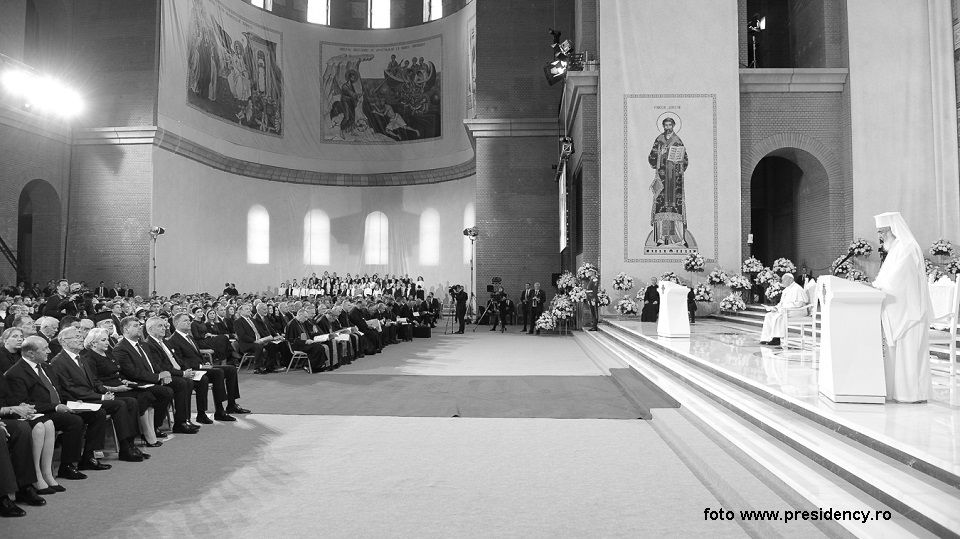January 25, 2017 UPDATE
Klaus Iohannis speaks before the Council of Europe's Parliamentary Assembly./Romania keeps making progress in reforming the judiciary and fighting corruption, reads the European Commision's report on progress under CVM.

Newsroom, 25.01.2017, 20:09
COUNCIL OF
EUROPE Romania’s President Klaus
Iohannis said on Wednesday in plenary session of the Council of Europe’s
Parliamentary Assembly that the world needs democratic societies, where
majorities do not take undue advantage of their rights, societies where the
principle of loyal and constructive cooperation between democratic institutions
works flawlessly. The President said that Romania has turned into a role-model
as regards the protection and promotion of national minorities’ rights, a model
acknowledged at European level. Also, the head of state announced that on April
6th, together with the Secretary General of the Council of Europe
Thorbjorn Jagland, will inaugurate in Bucharest an international conference
organized in cooperation with the Venice Commission on the roles played by the
majority and the opposition in a democratic society. On Tuesday, on the first
day of his visit to Strasbourg, the Romanian head of state met with Romanians
working at the Council of Europe and with representatives of the Romanian
community in Alsace. Also, he attended the ceremony marking the International Holocaust Remembrance Day.
GOVERNMENT ORDINANCES On Wednesday, Romania’s Superior Council of
Magistracy, which has a consultative role in the debate on the draft government
ordinances on pardoning and amending the Criminal Code, advised against the
proposed changes. Among other things, according to the drafts set forth by the
new left-wing Government in Bucharest, convicts sentenced to less than 5 years
in prisons would be pardoned. The pardon would not benefit repeat offenders and
those who committed certain offences stipulated by the Criminal Code or by
special laws. One of the proposed amendments to the Criminal Code stipulates
that a case of abuse of office will be considered a criminal offence only if
the damage exceeds 44,000 thousand Euros, and the maximum sentence will no
longer be 7, but 3 years in prison for such an offence. The two draft emergency
ordinances have been vehemently criticized by the opposition and citizens. Last
week, dozens of thousands of people marched the streets of Bucharest protesting
against these measures and President Klaus Iohannis joined them. The Justice
Minister Florin Iordache claims that these changes are necessary in order to
solve the issue of prison overcrowding and to get the legislation in line with
certain rulings of the Constitutional Court.
CVM REPORT Romania continues to make progress in
reforming the judiciary and fighting corruption, but criticism leveled by
politicians and the press against judicial institutions, the National
Anticorruption Directorate in particular, might undermine trust in the justice
system. This is one of the conclusion of the European Commission’s report on
progress in Romania under the Cooperation and Verification Mechanism (CVM),
presented in Brussels on Wednesday. According to the report, the fact that many
top-level politicians in Romania have been indicted and convicted is a sign
that, as regards the independence of the judiciary, the trend is positive. In
ten years of EU membership and by implementing reforms under the CVM, Romania
has made major progress, reads the report drawn up by the European Commission,
according to which the positive trend of the past three years will also be
reflected in the 2017 report. Romania’s President Klaus Iohannis, the left-wing
Government in Bucharest and the main judicial institutions in the country have
appreciated the report. The next CVM report is to be drawn up at the end of
2017. We recall that Romania’s judiciary system has been monitored since 2007,
when the country joined the EU.
2017 BUDGET Romania’s revised
draft budget will be debated by Government on Friday, and will be submitted to
Parliament on the same day, Prime Minister Sorin Grindeanu has announced. He
has also said that most of the money will go to the ministries of transport,
agriculture and health and to SMEs. The Presidential Administration and the
Romanian Intelligence Service, on the other hand, will get lower budgets, the
Prime Minister has also stated.
BREXIT The British Government has announced that
it will present on Thursday the bill under which it calls for Parliament’s
approval to officially start negotiations on withdrawing from the European
Union. On Tuesday, the Supreme Court of the United Kingdom ruled that Prime
Minister Theresa May must ask for Parliament’s approval to trigger article 50
of the Lisbon Treaty. Brexit Minister David Davis has stated that the British
Parliament will have to vote on the simplest bill possible. We recall that Theresa
May has repeatedly stated that the withdrawal procedure will start by late
March, and negotiations with Brussels will last two years.
CORRUPTION
PERCEPTIONS INDEX The rise of
populism in many countries is a reason for concern, according to Transparency
International’s annual Corruption Perceptions Index made public on Wednesday. Corruption and inequality feed off each other to
create a vicious circle between corruption, unequal distribution of power in
society, and unequal distribution of wealth. This makes people feel
disappointed and turn towards populist trends, which are by no means the right
remedy, the report says. The Corruption Perceptions
Index 2016 covers perceptions of public sector corruption in 176 countries.Denmark and New Zealand perform best
with scores of 90, closely followed by Finland (89) and Sweden (88).For the tenth year running, Somalia is the worst
performer on the index, scoring only 10 this year. Romania is on the 57th
position.





























